Introduction
National Quality Assurance Agency for Higher Education had to start its activities in fall 2015 right after its members were elected. However, Prime-minister, Minister of Education and Head of Parliament committee on education altogether refused to accept the results of the election because some members were previously distracted by lustration process. Therefore Agency was politically blocked and haven’t been active until summer 2016 when it gained two new elected members instead of lustrated ones.
After Agency started to operate CEDOS decided to conduct in-depth interviews with its members. First of all, we want to describe the collective portrait of members’ of Agency views on its most important functions. Thus we hope to draw public attention to the visions and plans of Agency for the near future.
Agency is the new public governance body which duties are described in 17-23 articles of Law on Higher Education. It is formed by 25 representatives from universities, National Academy of Science and branch academies, the association of employers and congress of representatives of students’ self-governance bodies. Employers delegate 3 members, and students elect 2 members. Representatives of universities are elected by conferences among representatives of public, municipal and private universities. Students are elected by the congress of representatives of students’ governments of higher education institutions. Three members are elected by a joint representative body of all-Ukrainian associations of employers. The rest is nominated by National Academy of Science and branch academies.
Members of Agency shall stay in office for the period of three years. The same person may not serve in Agency for more than two terms. Chairs and deputy chairs of the National Academy of Sciences and branch academies of sciences, rectors or founders of private higher education institutions may not be members of Agency.
Public budget allocations for Agency are established annually by the parliament within the state budget for each year. In general, Agency is non-for-profit organization and could be funded from the following sources:
- the public budget;
- payments for work on accreditation and licensure reviews and funds received as payment for other services related to higher education quality assurance in the amounts defined by Agency;
- grants on QA in higher education;
- other sources not prohibited by law.
According to the Law Agency got power to:
- define requirements for the higher education quality assurance system, design regulation on accreditation of programs of study with its subsequent submission for approval to the Ministry of Education and Science;
- carry out accreditation of programs offered by higher education institutions;
- analyze the quality of education activity carried out by higher education institutions;
- carry out licensure reviews and prepare expertise on granting a license for education activity;
- offer amendments to the list of fields
- build a database of programs introduced by higher education institutions;
- define criteria for evaluation of education quality in higher education institutions (including quality of research);
- identify requirements for PhD level and develop a procedure for PhD-degree award with its subsequent submission for approval to the Ministry of Education and Science;
- design regulation on accreditation of bodies which award PhD-degree and carry out such accreditation;
- carry out accreditation to independent agencies for assessment and quality assurance of higher education.
Methodology
During September and October of 2016, there were 17 in-depth interviews conducted with members of Agency. Altogether there are 25 members of Agency. The majority of interviews was conducted face-to-face, two by e-mails and one by phone. Some of the members were not interviewed. Mostly they refused to give any comments until Agency has been operating for a while. Sometimes they claimed lack of time.
Respondents were guaranteed anonymity, so the report does not contain any names or any other information that could identify them. That is also why the paper refers to the respondents as males, as there are only 4 women members in Agency.
Our goal was to describe Agency members’ opinions on its primary functions, find out the similarities and differences. The research focused in particular on the legislation and composition of Agency, accreditation, indicators that describe the quality of higher education and scientific performance, scientific degrees granting and the role of students, faculty members and other agents in internal quality assurance procedures.
The further paper is written upon the results of the interview with the members of Agency and is the summary of respondents’ thoughts on these matters.
Legal Framework and possible amendments
Not all of the interviewed members of Agency were ready to answer questions concerning the Law on Higher Education and possible changes to it. Some respondents mentioned that it would be more appropriate to give comments on this matter after Agency is active for some time as most of the issues, misunderstandings and adjustments will appear during work. One of the respondents noted:
There will never be an ideal law. We have to understand that we will never make it perfect and all-encompassing.
Those respondents who did answer the question were concerned with the need to specify the authority of Agency. One of the respondents said:
It is said that Agency has to implement the government policy in higher education, but it’s not clear whether Agency is the state institution or not.
Also, there is a need to detail the launching procedure of Agency.
One of Agency members believes that its Statute have to be changed, but it should be done after the institution has worked for some time. As for now, it is a good “starting model”.
Another respondent pointed out that despite the proclaimed independence of Agency, in fact, it is not independent. That is the case because government officials can get involved in the work of the institution by pressuring public universities through members of Agency who represent these universities. Furthermore to the respondent’s mind the Ministry of Education and Science has to say a lot in matters that are supposed to be regulated by Agency. Some other members of Agency share this thought. Also the need to specify and separate in authorities of Agency and Ministry was mentioned during the interviews. There was also an idea that Agency has to have a separate line in State budget instead of being sublined within Ministry’s budget. Another one of the respondents expressed his concern about the by-laws which are supposed to be written by Agency. In his opinion, these by-laws could bring back the Higher Attestation Committee or create some kind of its counterpart.
A few respondents mentioned the wide range of powers that Agency has, and this seems improper to them. In most of the European countries, QA Agencies have only one function, which is the accreditation of university programs. One of the respondents mentioned that he does not see the point of the different terms for different members of Agency. Also, the idea of dividing responsibilities of Agency between some institutions, or even laying them on the universities, was expressed. As the wide range of Agency powers enables both the Ministry and the universities to put some of their functions and responsibilities on Agency. A significant amount of Agency authority is not active. This allows Ministry and universities avoid performing certain functions explaining that they are Agency responsibility.
Almost all respondents agreed to give their opinions on Agency composition procedure. Each one of them mentioned the need for some changes: most of the suggestions referred to Agency personnel, in particular, the need to expand the quota for representatives of employers, private universities or colleges and training schools, as well as cutting the number of the representatives of public universities.
One of the respondents believes it is a good idea because it is a lot easier to find some pressure points for the public universities, which defeats the idea of Agency independence.
Furthermore, some mentioned the need to include the representatives of NGO organizations and leading foreign professionals to Agency team as the guest experts.
Besides the possible quota changes, some of the respondents mentioned changes that are needed in the selection process itself. One of Agency members pointed out that some of the people who “indeed are experts in higher education” didn’t make it to be elected to this institution. Some of the responses touched upon the need to establish additional qualification requirements for the candidates, for example, no plagiarism in any papers. Furthermore, some respondents think that the procedure itself could be more transparent. One of the ways to improve it is to provide direct elections with secret ballot procedure for those candidates who pass the bar of the qualifications.
One of the respondents believes that additional qualification requirements are necessary, but does not see the point of changing the election procedure. According to his words, one of the candidates during the election is believed to be the Ministry representative (officially working there), who could have had a significant influence on the representatives of the public universities. Nevertheless, he was not elected, and this may prove that voters (as employees of public universities who are under the authority of the Ministry) elected Agency members based on their personal preferences and not the employment-related ones.
Also, members of Agency are not comfortable with the fact that their activity becomes legitimate only by the act of the government as it questions Agency independence.
Accreditation procedure: current problems and needed changes
Most of the respondents pointed out how outdated the accreditation procedure is now. Many of them see the biggest problem in the vast amount of formalized requirements which are based on the quantitative indicators. For example, some of such indicators are the area of libraries and computer rooms. Some respondents mentioned that current procedure does not correspond to the European one. One of the interviewees mentioned the need to address to European accreditation associations for recommendations on the appropriate accreditation indicators.
One of the respondents mentioned that methodology used in Ukraine is recognized worldwide and the only thing that needs to be changed is criteria. Another member believes that Agency should turn to international experience but adapt it to the Ukrainian reality at the same time.
Another one said that while there is no new accreditation of study programs, it was difficult to tell what issues might occur with the procedure.
Some of the respondents offered new criteria most of which included the alumni employment and salary rates. Agency members suggested giving more weight to the university's self-evaluation and paying attention to the amount of funds universities get from sponsors and international grants (as such sources give preference to the universities with the high quality of education). There was also thought about the need to establish new criteria based on the conditions created for students: taking into account the syllabuses, social and domestic conditions and the overall conveniences for the students in each university.
The respondents mentioned the need to take into account the opinion of stakeholders, as well as results of rankings in each field of study. One of the respondents believes there should only be accreditation organizations that represent a specific field of studies. For example, the law programs should have an accreditation done by the representatives of the Ukrainian Bar Association.
One of the respondents mentioned that changes need to start with licensing and not with the accreditation. Besides that, he believes that these two concepts need to be separated. First of all, licensing has to become more democratic and “all-encompassing”. Another respondent offers more radical democratization and stands for cancellation of licensing. He believes that market of educational services should be more open so that everyone who wants to provide such services can do it at any moment. In this case, the demand from applicants and accreditation from Agency as well as from independent institutions will be an indicator of program quality. This way accreditation will not serve as the permission or prohibition to provide the educational services. Instead it will become a “quality label” – some indicator which applicants may consider when choosing a university or a program.
A few times members of Agency mentioned the need to assimilate international practices in accreditation: the procedure itself, experts participation and their trainings.
One of the respondents, referring to international practices, talked about two possible approaches to the accreditation procedure in Ukraine. The first one focuses on students’ results. It means that students are assessed in some way, and the decision on whether to give accreditation to the university or to the program is based on those results. Another approach takes into account the whole system of quality assurance of the program. If the system works, it means that “the program educates good students”.
There was also a three-step process of accreditation proposed by one of the respondents. The first step includes self-evaluation of program, mission and goals of the university. Defining its mission and vision university evaluates its own program based on questionnaires compiled taking into account the standard. Thus the university can see the problems that should be solved before the second stage. As a result, the first phase provides diagnosis, self-awareness and a test of being honest to himself. During the second phase, external experts evaluate the quality of education at the program. Before assessment they must undergo appropriate training to avoid misinterpretations of their questionnaire based on which they carry out the assessment. The third phase is the decision about the accreditation of program that is made upon corresponding the results of the self-evaluation and the assessment that is given by the experts. If the those two do not collide the accreditation is granted.
Some respondents mentioned that employers should be the members of the accreditation committees. Furthermore, it is important that each committee has experts in the field of studies related to the program which is getting accreditation.
Some respondents think that students should not take part in the accreditation because they can not be considered experts, not to mention that they would have to miss their studying. However, there were some who thought that students’ participation was necessary: their opinions have to be taken into account, and a pool of such student-experts has to be created, as right now there are not a lot of those who could professionally take part in accreditation procedures.
All respondents shared a thought about developing the list of criteria for candidates to accreditation committees. The list may contain such criteria as the knowledge of English, an academic degree, previous experience of working in some particular field, etc. One respondent believes that graduates of international exchange programs (who bear an alternative experiences) can become agents of change.
All interviewed members of Agency pointed out the importance of providing both training and further skill improvement for the accreditation experts. None of the respondents could shape out the principles, but most of them believe it is best to turn to the international practices. Also, the respondents think that the coaches for Ukrainian experts should be foreign professionals.
Avoiding the conflict of interest is an important part of the selection of accreditation experts. Most believe that each expert of each accreditation committee should be chosen very carefully to avoid such conflict. So there should be information about the expert’s previous professional experience, possible connections with each university. One of the respondents stated that there should be an administrative or criminal responsibility for those who conduct the accreditations in case they violate the rules. There are also those who believe that this is the matter of expert’s integrity and in a case of any potential conflict of interest they should notify the management of Agency about it. Some think that accreditation should be performed by the independent agencies so there could be no arrangements between rectors about mutual accreditations. One more way to avoid conflict of interest is standardized accreditation conclusions in which experts should be guided by a detailed and formalized questionnaire. Furthermore, one of the respondents believes that fair high salary should motivate experts to work more efficiently and should reduce the risks of bribery, corrupt practices and favoritism.
Some of the members offered to implement the automatic random selection among a pool of accreditation experts in every field. So when the accreditation committee has to assemble, a computer chooses random experts in particular area to be the members of each committee. One of the respondents mentioned that besides such automatic selection it would be a good idea to have some independent testing and rating of such experts done on a regular basis.
Also, some claim that Agency should become a member of the European Association for quality assurance in higher education, which will give possibility to invite foreign professionals to be the experts in these accreditation committees as one of the most efficient ways to avoid conflict of interest.
Scientific degrees
Among the possible changes in the system of granting scientific degrees mentioned by respondents there are a few the most popular ones. Some of them referred to the need to call off additional payments for scientific degrees, as for some of people it is the only motivation to have a Ph.D. thesis. One of the respondents suggested covering such payments through grant funds or tender processes as an alternative to the state funding. Another one offered to cancel the state guaranties for additional payments and settle this matter with the contracts between the university and each professor. Many changes that were mentioned during the interviews concerned the specialized scientific councils. One of the respondents believes that universities should not be allowed to assemble specialized councils in those fields that are non-major for them. Furthermore, a few respondents mentioned the lack of control of such councils. To their mind, the situation can be changed with one-time councils – the members of which will be assembled only for one particular defense of the thesis. There was also an idea to have an automated random assignment of PhD candidates to the special councils. So there should be a system which selects the council of the defense randomly. It will make the corruption impossible or at least less possible, as the candidates will not be able to choose the councils for themselves.
One respondent thinks it will be a good idea to have some qualification requirements for the Ph.D. candidates – first of which should be proper English level. Another respondent believes it is best to diverge from the formalized criteria and take into account the quality and possible practical usage of the paper. One of the respondents mentioned that “we need to make the process as liberal for the candidates as possible: cancel the requirements on the number of pages, paragraphs and previous publications”. Also, there was a suggestion to allow candidates to defend their theses when the paper is done without having them study a required number of years. One of the respondents believes there is a need to make up criteria for granting scientific degrees in such “specific” fields as culture and arts, PE/sport and marine specialities.
Some also expressed the need to establish qualification criteria for the members of the specialized councils. Besides, the universities should be responsible for the screening of such members and for defense process itself.
There were also respondents who were not ready to discuss the changes in the system of granting scientific degrees:
It is nonsense that the QA Agency has to decide something in the matter of granting scientific degrees.
Plagiarism
Not all of the respondents agreed to estimate the level of Ph.D. theses that contain plagiarism.
Those who answered the questions feel strongly that the level of plagiarism in Ph.D. theses is high: they estimated it from 60% to 90%. The refusals to give an answer were explained by the unclear definition of plagiarism:
The matter of plagiarism is very wide. And it can not be decided just like that: one makes a citation here, does not make a citation there, this is plagiarism, that is not plagiarism.
The respondents did not agree on the definition of plagiarism. One of them thinks it is more appropriate to talk about academic integrity:
We regard it as follows: if you copied one source it is plagiarism, two sources – compilation and three – you have a Ph.D. thesis.
Due to these reasons, one of the respondents named the main goal of the Ethics Committee within Agency and Agency itself to define the meaning of plagiarism for each field.
Some of the respondents are sure that plagiarising is a question for the applied sciences as the papers have to be written upon the research and experiments while in Law science “…90% of the Ph.D. thesis is the law citations. So where can there be plagiarism? One can just forget to put a source”.
Mostly respondents mentioned two ways to fight plagiarism: creating a national repository of academic texts and educating students about the academic integrity, in particular implementing the classes on academic integrity or on academic writing, as well as activities that raise awareness about the issue. Some of the respondents felt that there is a need to create some kind of nationwide software “Anti-Plagiarism” program which will be implemented in all of the universities and research institutions. Besides a lot of the respondents mentioned the importance of regulations: how the fact of plagiarizing may be proven, what kind of responsibilities and sanctions may be occurred. They also mentioned that the members of specialized councils that allowed the plagiarized thesis to be defended have to be banned from working in their field. Some thought that appropriate ways to fight plagiarism are the publicity of the investigated plagiarism cases and laying the responsibility on the opponents who read the thesis. One of the respondents believes that strengthening intellectual property defending rules is effective in preventing plagiarism, as it is in the author’s interest to not allow the incorrect usage of his work. There will also be an extra motivation for the author: the money compensation in case his texts are copied.
One of the respondents summed up the question:
Plagiarism is everybody’s fault: it is a fault of those who write, and of those who read, it is a complex problem in our academic environment.
Participation of stakeholders in the process of quality assurance – links with business, professional associations, student organizations.
The questions that address the role of different stakeholders in the process of quality assurance in higher education were taken from the report of the European University Association (Examining Quality Culture in European Higher Education). The respondents had to answer the question about the ways of involvement for the professors, university and faculty management, administrative personnel, students, alumni, and employers. The results are presented in chart below.
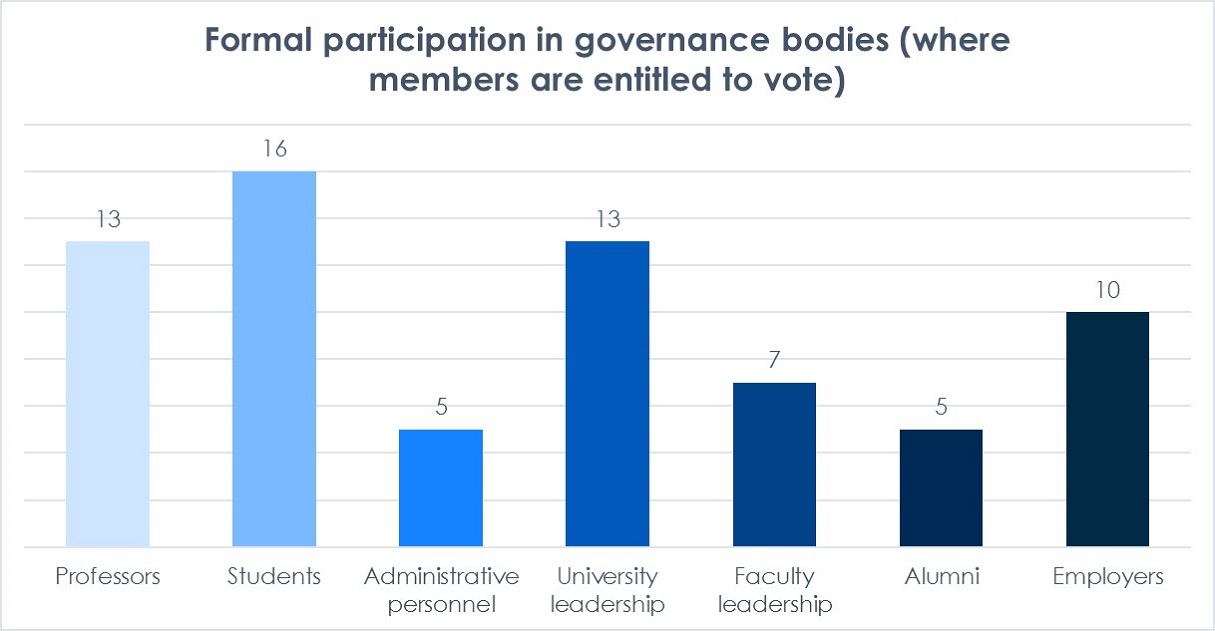
Almost all respondents (16 out of 17 interviewed) believe that students have to be involved in governance bodies where members are entitled to vote. The example of such involvement may be participation in the meetings of Academic Senate. The minority of respondents thinks that administrative personnel has to participate through such bodies.
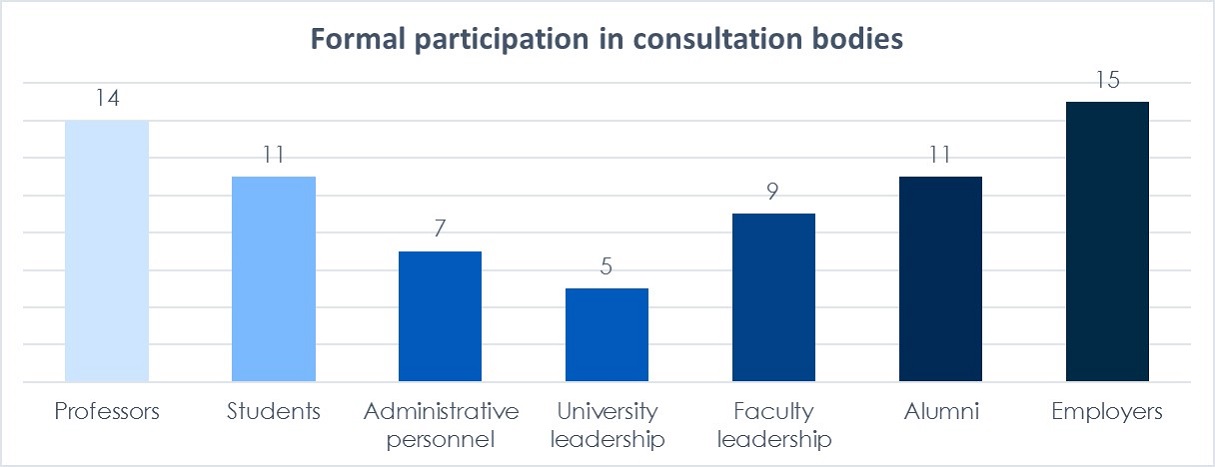
The question of the stakeholders formal participation in consultation bodies was hard to comprehend for most of the respondents. Some of them at first did not understand what they are asked about and what kind of bodies are for consultations. After the explanation, most agreed that professors (14 respondents) and employers (15 respondents) should have this right. However, less than half of the interviewed members of Agency believe that the university leadership and administrative personnel should provide consultations.
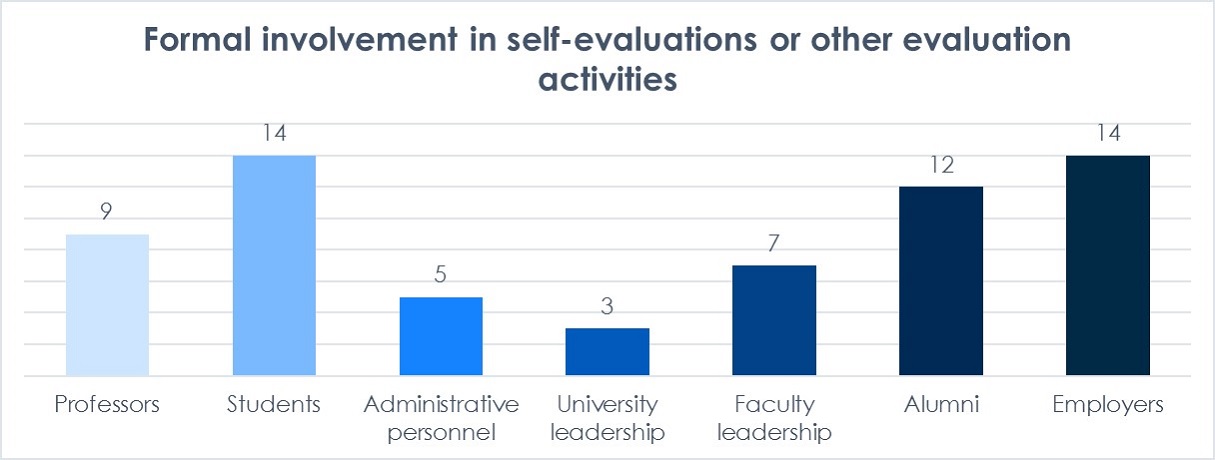
Most of the respondents believe that students, alumni, and employers should participate in the self-evaluation. Less than half of the respondents mentioned that this type of involvement should include the university leadership and administrative personnel. One of the members of Agency mentioned during the interview that only employers can evaluate the quality of education in the university:
No, this should not be at all. It is a biased opinion. Students are patriots. Professors are patriots. Only the employers can be involved.
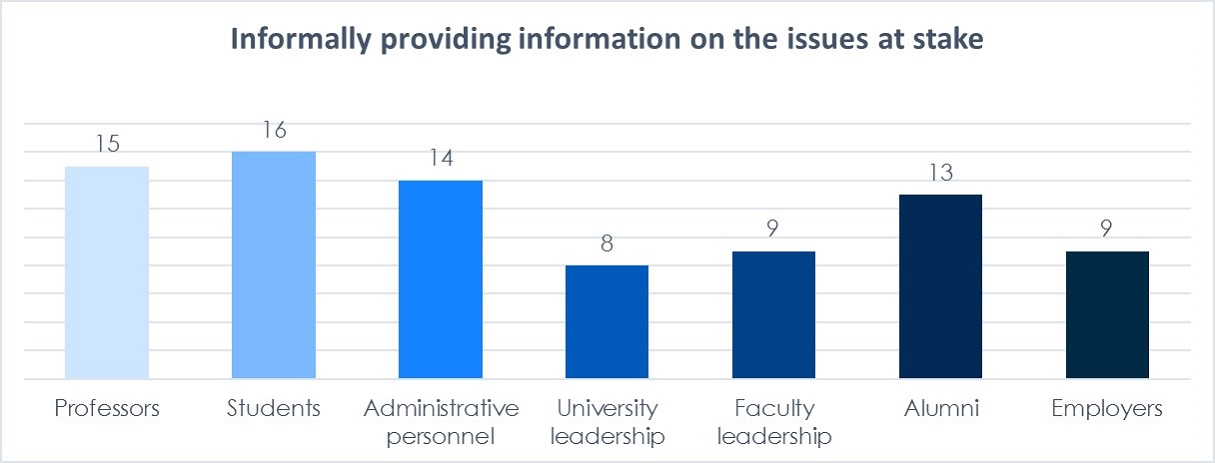
Majority of respondents (16) mentioned that students should participate by informally providing information about issues in university. Also, almost all respondents believe that professors, administrative personnel, and alumni could provide the quality assurance in the university in this way. All in all, most of the respondents believe it is best to involve all of the stakeholders, including the university leadership (8) and faculty leadership (9).
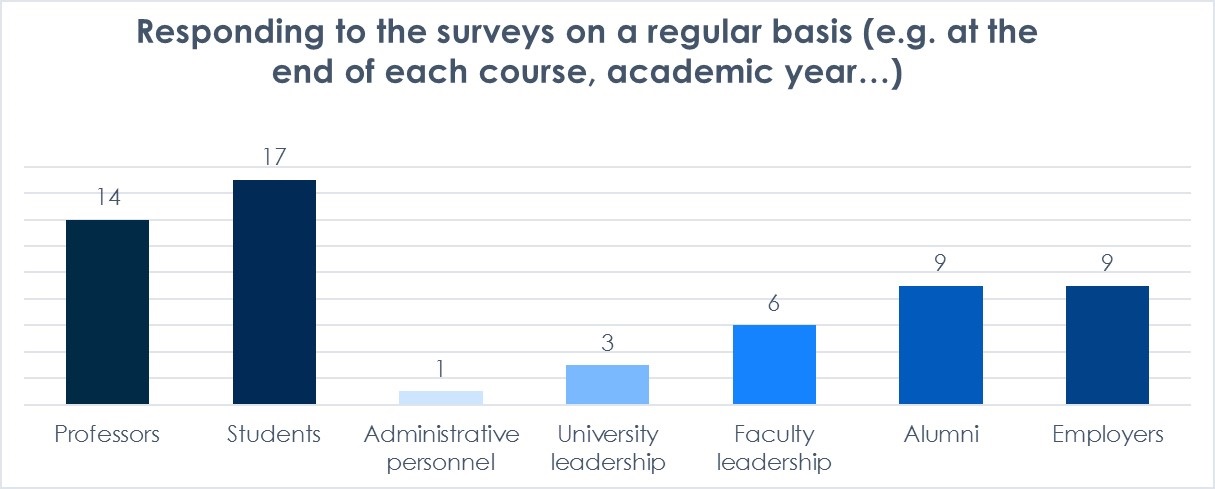
All of the respondents think that students should participate by responding to the surveys about the quality of education in their university on a regular basis. Also, most of them believe it is important to involve professors, alumni, and employers in such surveys. However, only a few think that it is necessary for the university and faculty leadership to participate. Only one of interviewed members of Agency believe that administrative personnel should be surveyed about the quality of education in their university.
One of the respondents mentioned that administrative personnel should not be involved in internal QA procedures. Another one does not see the need to involve the university administration.
Consolidation of the responses allows us to compare the ways of participation and the level of involvement for the different stakeholders that are popular among the respondents.
In particular, the interviewed members of Agency see professors and students more involved than any other agents. Actually, they believe that students have to participate more than professors in all the activities, aside from the involvement in the consultation bodies.
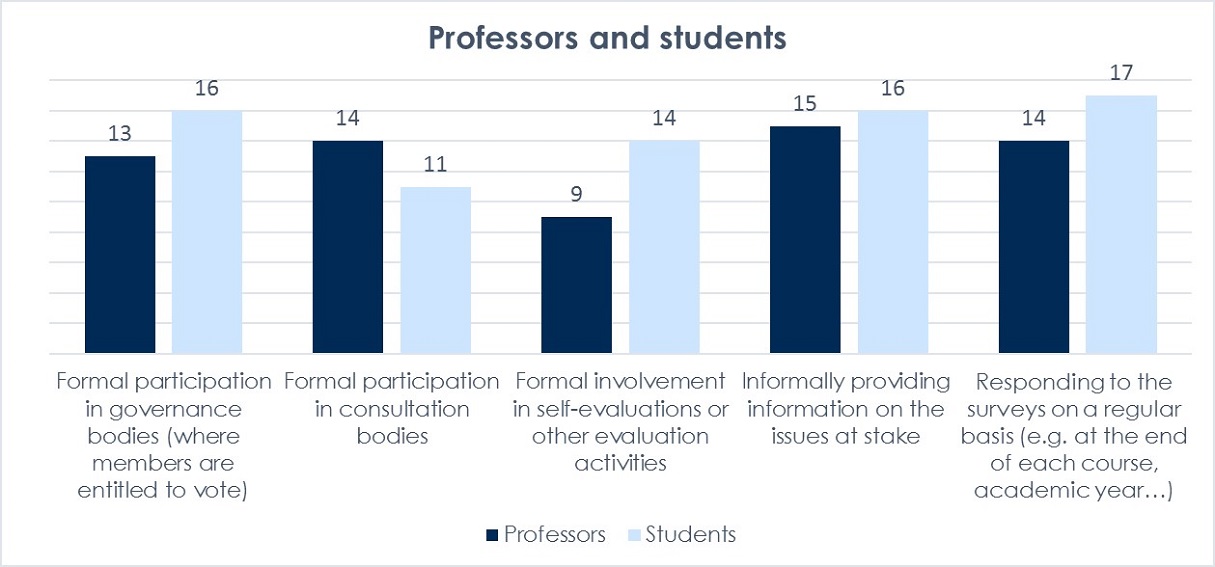
Most of the respondents believe that the university leadership has to be involved through formal participation in governance bodies. However, the rest of the administrative personnel has to participate mostly by informally providing information about different issues and matters.
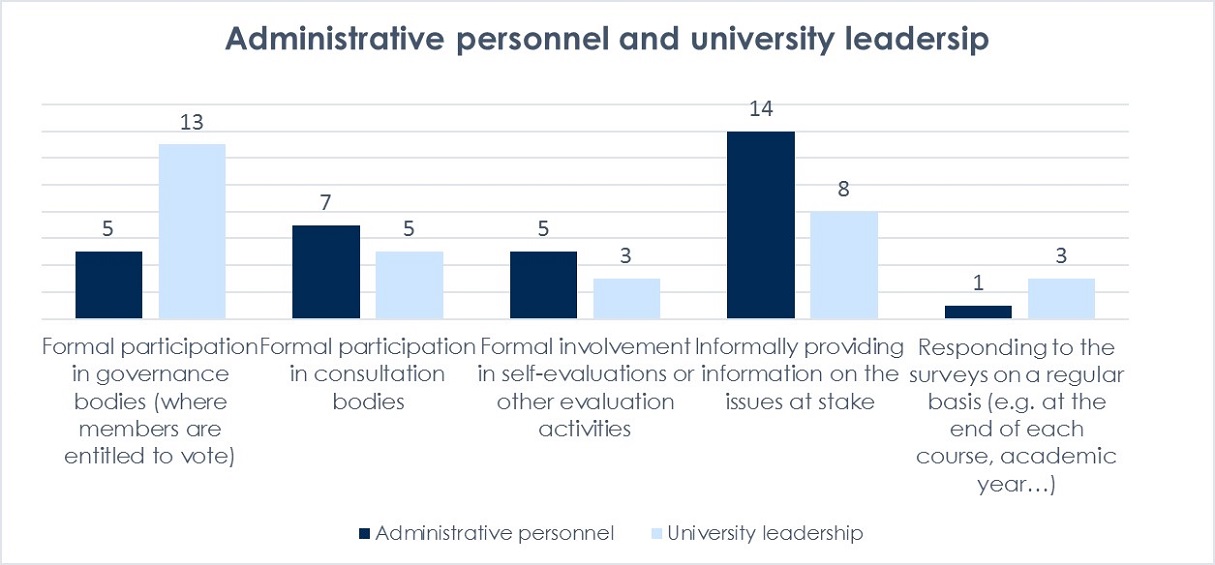
Respondents differ the ways of the alumni and employers’ participation. Employers have to be involved in more formal ways while alumni should informally provide information. Although, most of the interviewees think that alumni should also be involved in the governance bodies as well as in the consultation bodies.
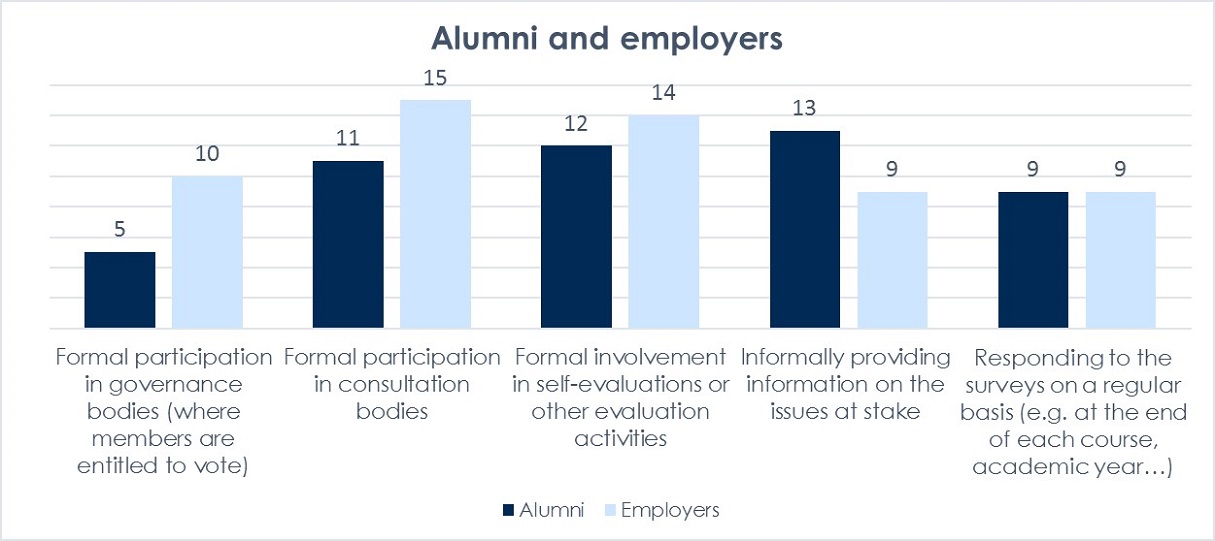
Indicators of quality – which numbers/parameters to trust
Most of the members of Agency who were interviewed named the employment rate as the dominant indicator of the quality of education in the university. There were also those who offered to take into the account alumni salary rates for each field of studies separately and independent opinions of the employers.
Other members of Agency believe that one of the important parameters is the result of studying: grades during first two years for bachelor programs or average level of academic record for whole program for MA level. Two respondents mentioned that human capital (mainly faculty members) is the main indicator.
There was also thought that regulations on the organization of the educational process is the most important indicator of the quality of education in the university. Such documents may show the unicity of the university and how the educational process is done there.
Among the indicators mentioned as less important than dominant one was no clear leader. A few times respondents mentioned equipment and material support of the university, a lot of them believe financial support to be an important parameter – first of all, extrabudgetary means. The idea behind it was mentioned above: international sponsors and grant donors will not be willing to contribute to the universities that do not provide a high-quality education. Although not everyone talked about sponsorship or patronage when discussing university finance. Some of the respondents believe the fair salary for the professors is the indicator that university gives a quality education. Some mentioned the importance of the conditions for the professors: what are the teaching and housing policies and facilities.
Some of the respondents mentioned how important the student-related parameters are: how many students take part in the international conferences or write scientific papers. One member of Agency believes that the opinion of the students and academic community may point out the quality of particular university.
Among the indicators that also refer to the students’ activity, the respondents mentioned the level of academic mobility, the level of knowledge of foreign languages (English in particular) and “IT-competences”, and also more formalized parameters: grades for the MA theses and the overall grades of the State Examination Jury. They also mentioned social and environmental conditions for students. For example dormitories, the conditions of buildings, the medical office and the classrooms.
One more parameter that some respondents thought of was the scientific work of the university’s professors: citation index, publications in the international journals, participation in international conferences. Furthermore, one respondent suggested taking into account the number of professors who work or have internships abroad as they represent Ukrainian universities.
One of the respondents believes that the level of professors’ participation in the writing of the quality assurance strategy of the university is important, as well as the further involvement of the professors to the implementation of the strategy.
One of the respondents mentioned the value of the university to the society as the parameter that correlates with the quality of education. The value to the society may be measured in the number of libraries that was opened by the university, or in the fact that the university does some career-guidance in schools. Also one of Agency representatives mentioned only the parameters that are used for medical universities assessment.
Some respondents named the only one indicator – the alumni employment – as the main and only one that could correlate with the quality of education in the university. So there are no other parameters that could show the level of education.
Furthermore, one respondent believes that it is hard to talk about more or less important indicators in this case, as only the combination of factors matters.
Many respondents named the citation index in the bibliographic databases among the dominant parameters of the scientific performance in the universities. At the same time, some see the citation index, the number of publication in professional journals and the number of Ph.D. degree awarded as the formality, as these parameters have nothing in common with the quality of education, therefore can not be used for the evaluation. Also, some emphasize only one important indicator: either practical benefits (utility) of the scientific performance or the lack of plagiarism in the papers.
A lot of other indicators that are viewed as less important referred to the international acknowledgment: the scientists’ participation in the international projects, internships abroad, contracts with foreign universities, membership on the editorial boards of the international and Ukrainian journals. The rest of the indicators that were mentioned by the respondents referred to practical benefits: participation in the expert committees that consult the real economy sector (for example, in building, real estate appraisal and evaluation of the universities), the number of inventions put to work (the number or working patents, the amount of money the university got for these inventions).
One of the respondents believes that these indicators can not be universal. There are lots of sciences for which the citation index and the number of publications are relevant, but they can not apply to Ukrainian philology as their papers probably will be not interesting for the international journals. Also, a few members of Agency noted that it is important to separate the indicators for the applied and fundamental studies. One respondent claimed that investments and utility are the most important indicators for applied sciences. While it is important to take into account level of scientific schools, rankings – (both national and international) for fundamental studies.
One of the respondents gave the list of indicators that is used to evaluate medical universities.
Also, there was thought that it is more appropriate to evaluate each of the scientists individually (peers):
There is no such thing as the evaluation of scientific performance in the world…There should only be the evaluation of each scientist individually.
Collaboration with independent QA agencies (professional associations etc)
Most of the respondents did not give an answer to the question of the accreditation of the independent QA bodies. Mostly members of Agency explained that they did not study this issue so they can not comment on it. However, they mentioned that they could get back to it after the Agency meeting where the accreditation of the independent QA bodies will be discussed.
Those of the respondents who did answer had quite different thoughts about it. One is that it does not make sense to set up such bodies in Ukraine right now. First of all, there are no people qualified to conduct an expertize. Second of all, in other countries, these agencies support themselves, as the universities pay for the accreditations. However, universities in Ukraine will not do it, as there is no motivation for them. The lack of motivation is explained by the lack of students’ interest in the reputation of the university, which is provided by the accreditation. So some respondents believe that one Agency is enough for Ukraine (at least for now).
However another respondent sees the need to create a network of such QA bodies, while Agency will be heading this network. The idea is that most of the work will be done by these independent QA bodies, and Agency will handle the function of the state control over the quality assurance.
Another member addressed the German practices, where they have a separate institution that does the accreditation of the independent QA bodies. It is the only function it has, so it does not conduct the accreditation of universities or programs. At the same time the respondent mentioned that he is not sure whether Agency has to provide the accreditation for the independent QA bodies and maybe it is better to separate these functions. However, if this duty remains at Agency disposal, the accreditation should be done based on the European standards and guidelines for quality assurance in higher education. Then the criteria for the independent QA bodies will include a regular reevaluation of their work, improvement and transparency – publication of all the materials on the website and full openness to the academic community.
Two other respondents mentioned similar standards. One of them believes that Agency should provide accreditation based on “the principles of proficiency, transparency, morality and following the rules and criteria with the foundations of publicity and consideration for public opinion”. For another respondent, the most important parameter is no involvement of the people who plagiarized their papers in the work of the independent QA bodies.
National online students survey
During the interviews respondents had to give their opinion about the launch of the nationwide online students survey about the quality assurance in the universities. The responses were quite different. Some respondents believe that such results would not show the real picture, as it is hard for students to evaluate the quality of education. Also some pointed out that there is a room for students’ manipulations: some of them can give their teachers either too high or too low grades on purpose.
One of the Agency members believes that such a survey should take place but only the best students should be the ones to take participation in it. As only diligent and motivated students can have a right to have any influence on the education process.
One respondent stated that the national survey would not give the adequate picture. Another one believes that such surveys have to be conducted only inside each university and used for inner purposes only. The results, for example, may be used to improve the curriculums to suit the needs of the students and the employers.
Another member stated:
These results can become the instrument in the unfair game of the universities’ attempts to get applicants.
He believes these survey can be effective if the respondents are the students who have completed some level of education.
One respondent thinks that such opinion polls are the only way to get feedback from the students, and another one thinks it would be a good way to get educational statistics. There were also different thoughts on how the results could be applied. Some respondents stated that the gathered data is not supposed to be public and should only be used by universities for their own assessment.
However, most of respondents believe that the results have to public and could be used to make up the universities rankings or even programs rankings. This way they would be useful for the applicants and their parents as they will have a chance to learn more about a particular university or program. Furthermore, this data may be used for the universities’ improvement of its quality of education, changes in curriculums and personnel. On the national level the information may be used by Agency (in order to give universities some recommendations), by accreditation committees or by the employers.
Conclusions
The interviews showed that respondents have similar thoughts on the legal framework of Agency, its composition procedure, the accreditation of programs and on how the scientific degrees should be granted: the current situation is mostly insufficient and needs to be changed. However, they have different thoughts on how the problems should be solved and what are the indicator of the quality of education and scientific performance, as well as what roles should stakeholders play in internal quality assurance.
Most of the respondents do not agree with the current legislation on Agency. Mostly it means the need to specify the normative regulations of the institution and its authorities (including the wide range of duties, and separating the ones of the Ministry and the ones of Agency). Also, respondents criticize the composition of Agency and the distribution of quotas: under-representation of employers and over-representation of the public universities (in relation to the private ones). Also, the respondents are not satisfied with election procedure. One of the reasons is the lack of transparency, which can be solved with the election by secret ballot for those candidates who pass the bar of qualification requirements. Also the inadequacy of legitimizing the members of Agency through the government’s act was mentioned. However, some respondents believe that it is more appropriate to comment on this matter after Agency will be active for some time.
The biggest problem with the current accreditation of programs is how formalized they are: most of the requirements are based on the qualitative parameters. Some respondents think that current procedure does not correspond to the European one. It was offered to change the criteria to the new ones: alumni employment and salary rates, and the indicators that would represent both the students’ and stakeholders’ opinions. Furthermore, the need to involve some international practices was often mentioned. Many respondents are sure that employers need to participate in the accreditation committees, some believe that students should participate as well. There was a common thought that experts involved in those committees should be professionals in the field that is related to the program which is getting accreditation. Furthermore, there is a need to create a list of requirements for such experts: the level of English, previous work experience in the field, academic degree.
It was suggested to carefully choose the experts to the committees, collect the information about their professional experience, a possible connection with the university, to avoid conflict of interest between them and the program they accredit. Less popular were ideas to rely on the expert’s integrity, to have the standardized accreditation conclusions, ideas of fair pay, automatic random selecting, administrative or criminal responsibility and membership in the European Association for quality assurance in higher education.
Most of the respondents believe that the system of granting scientific degrees should be changed. In particular government should cancel additional payments that come with the degree, or switch to the non-budgetary funding of these benefits. Some other changes address the work of specialized scientific councils: the need to control the specialization (to forbid the university to open special councils of non-major specializations), to control its work, to assemble the members only for one-time defense, provide a system that would randomly assign candidates to councils and specify the qualification requirements for the candidates (including level of English). Also, the changes to the defense procedure itself were discussed: the need to cancel the requirements on the number of chapters, pages and publications and the need to let the candidates to have a degree when the thesis is ready, without having to study a specific number of years.
Almost all of the respondents who agreed to evaluate the level of plagiarism declared a negative attitude towards it and are sure that there is a lot of it in Ph.D. theses in Ukraine. Also, they mentioned the unclear definition of plagiarism and the need to rather talk about the academic integrity.
Respondents offered some ways to fight plagiarism: educating students about the principles of academic integrity and creating a national repository of academic publications, creating a national software “Anti-Plagiarism” program, which will cover all the universities and research institutions, enforcement of regulation of this issue, the sanctions for the members of the specialized councils and opponents who allowed the plagiarized theses to be defended, publicity for the cases of plagiarism that were discovered and strengthening intellectual property.
Most of the respondents believe there is a need to include students, employers and alumni to the regular surveys about the quality of education in their university. For example, such surveys could be conducted after the end of each course or each academic year. Only a few of the respondents see the need to involve administrative personnel to the inner quality assurance procedures.
The informal providing of information about the issues turned out to be the most inclusive type of internal QA: most of the respondents think there is a need to take into account the opinions of all stakeholders.
The most important indicator of the quality of education in the university is the alumni employment, their salary rate and the opinion of the employers. The respondents also mentioned the academic results, the regulations on the organization of educational process in the university, the equipment and material facilities, the university’s funds (sponsorships and grants, the salary of the professors), students’ participation in international conferences, the level of English and “IT-competences”, the papers written by students, the level of students’ academic mobility and the value of the university to the society.
To evaluate the level of scientific performance in the university, the respondents offered to use the citation index in the international databases, the utility of scientific performance, absence of plagiarism in papers and international acknowledgment. Some respondents believe that citation index, the number of papers and Ph.D. degrees are just a formality and do not correspond to the quality science.
The hardest question for the respondents was the one about the accreditation of independent QA bodies. Most of them did not answer it either because they have not yet made sense of it or because the point is not yet taken further. Others believe that for now there is no need to set up these bodies, or at least rely on the international practices when doing so.
Support Cedos
During the war in Ukraine, we collect and analyse data on its impact on Ukrainian society, especially housing, education, social protection, and migration










